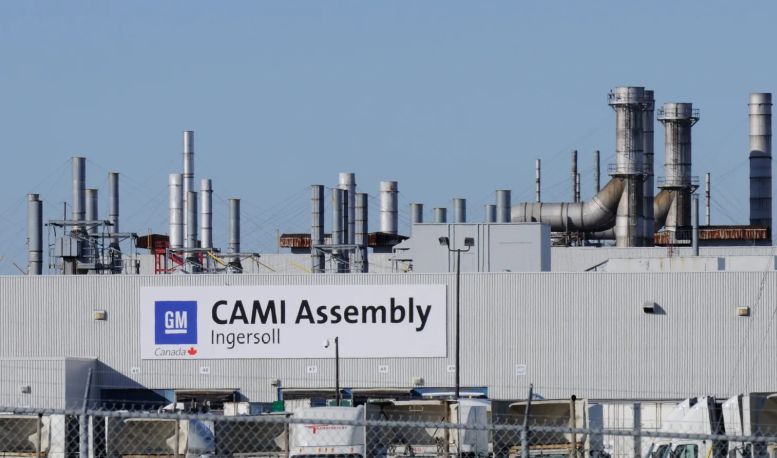Donald Trump has called “tariff” his favourite word, showing that he must have a limited vocabulary. When he imposed tariffs on steel and aluminum imports in 2018, he claimed it was protecting American industry. In reality, these tariffs were a nationalist smokescreen for a deeper capitalist crisis — one where working people, not corporate elites, bore the costs. For Canadian autoworkers, the tariffs were not just an aspect of economic policy; they were a brutal reminder of how the capitalist system pits workers across borders against one another in a race to the bottom. The 2025 tariffs are no different.
The 25 percent tariff on steel and 10 percent on aluminum — key materials in automotive manufacturing — had immediate ripple effects throughout North America. Canada, the largest supplier of both metals to the US, has been hit hard. The Canadian auto industry, closely integrated with its American counterpart through decades of cross-border supply chains, is facing a new economic squeeze. Automakers and parts manufacturers have scrambled to adjust to rising costs, delayed deliveries, and the threat of further trade restrictions.
General Motors is famously associated with the saying of one of its former heads: “What’s good for General Motors is good for America.” There might have been a scintilla of truth in this claim in the boom times of post-war US capitalism, but it certainly is not the case today, whether the country in question is the US or Canada. GM has announced it will eliminate one of three shifts at its Oshawa plant, cutting roughly 700 jobs as it “adjusts” its North American operations in response to the 25 percent tariff. Further cuts are expected. The Oshawa facility, which currently builds Chevrolet Silverado pickup trucks for the North American market, will now focus more heavily on producing light- and heavy-duty trucks for Canadian consumers. GM has also closed for months its CAMI Assembly plant in Ingersoll, hitting 1,200 workers.
In the US
GM has warned that it could face $4 billion to $5 billion in tariff-related costs this year and plans to offset the hit by cutting spending and increasing production in the US. When profits are threatened, big business “adjusts” by closing down, relocating operations and destroying communities. Stellantis has announced 900 layoffs at five US plants and is pausing production in some Canadian and Mexican plants. Ford says layoffs are on the horizon. Manufacturing reports show that over 4,000 workers have been fired from 19 factories in the US, and 15 factories have closed altogether. Cleveland-Cliffs mining company has fired 1,200 workers in Michigan and Northern Minnesota citing weak auto demand, and the United Steelworkers union is reporting hundreds of its members have already lost their jobs.
These cuts reflect the cumulative weight of years of trade uncertainty, automation, and cost cutting, where corporate decisions are made thousands of kilometres away with no regard for local communities. And in every press release, the same sanitized excuses are offered: “adjusting to market conditions.”
In Canada
The new Carney government has declared that Trump’s tariffs and talk of 51st state mean Canada’s old relationship with the United States is over. He has pledged to support domestic auto manufacturing. He says that Canada can sustain an auto industry that pays the US tariffs provided the government and business community work to “reimagine” and “retool” the industry. Naturally, any reimagining and retooling will come at the expense of Canadian taxpayers in the form of government subsidies and bailouts.
The governments of Canada and Ontario gave billions of dollars in handouts to big corporations VW, Stellantis and Honda to encourage them to build factories making electric batteries. Honda has announced it has “put on hold” its investment in electric vehicles factories in Ontario, despite handouts of $5 billion from the Canadian and Ontario governments. Northvolt got $7 billion to build a plant in Québec, but its parent Swedish company has gone bankrupt.
On top of the GM closures, Stellantis has cut shifts for 4,500 workers in Windsor. The whole auto industry, which supports 128,000 jobs and indirectly supports an additional 462,000, is destabilized.
Capitalists win, workers lose
Even as autoworkers are losing their livelihoods, Canadian financial elites are circling the wagons around the same tired solutions. While Mark Carney promotes a green, “inclusive capitalism,” beneath the slogans is the same old allegiance to global finance and corporate-led growth, sweetened with bribes to big business.
Carney, representing the polished, international wing of Canadian capitalism, speaks of managing “transition” and “sustainability,” yet offers no real plan to protect working-class communities from the ravages of plant closures and outsourcing. Under his worldview, trade wars are unfortunate glitches to be managed by experts — not existential threats to working families.
Divide and conquer
Trump’s “America First” economic nationalism, far from protecting US workers, is a tool to divide the working class. By blaming foreign competition — especially Canadian, Chinese, and Mexican — for domestic job losses, Trump obscures the real culprits: multinational corporations outsourcing to low wage economies, automation driven by profit motives, and decades of union busting and deregulation. Doug Ford counters Trump’s tariffs with “Canada is not for sale.” The latter has found traction among some Canadian workers who fear that their jobs are being sacrificed to protect American interests. But workers should resist this divisive rhetoric. The truth is workers in Detroit and Oshawa, Windsor and Toledo, are not enemies — they’re victims of the same exploitative system. The only winners in this trade war are the capitalists who are using the chaos to consolidate power and justify further austerity.
The role of labour
Tragically, labour leadership in both Canada and the US have failed to mount a serious, internationalist challenge to these attacks. Unifor, Canada’s largest private-sector union and the primary representative of auto workers, has largely focused on lobbying officials and launching nationalist ad campaigns like “Build it Here.” While understandable as a defensive tactic, this narrow focus misses the bigger picture.
The unions have raised some good points such as the joint Unifor/CUPE statement that demands “Strengthen the Transportation Sector, Support and Expand Public Services, Support Investment in Public Infrastructure.” However, their protectionist calls to “prioritize Canadian-made products,” leading to the creation of good jobs, assumes that a made-in-Canada approach will actually create good jobs. Unifor is calling on Carney’s government to revoke GM’s recently granted tariff-exempt status, arguing that the company is violating its commitments to Canadian production. Unifor is also urging Carney to meet with the heads of major automakers to publicly reaffirm their commitments to Canadian investment and production.
Under the Unifor-GM Collective Agreement, GM is required to meet with Unifor in the near future to review all options to prevent or mitigate job losses at Oshawa Assembly. Unfortunately, GM doesn’t have a great record when it comes to complying with clauses related to employment guarantees in the Collective Agreement.
However, instead of rallying for cross-border solidarity, Unifor and its American equivalent, the United Auto Workers (UAW), accept the logic of competition — bidding for jobs by offering concessions, tax breaks to employers, and reduced standards for new hires. Lana Payne, president of Unifor, has been trying to convince companies to “not give up on Canada.” In response to GM’s announcement that they will shut down their CAMI plant, Payne appealed to General Motors to “do everything in its power to mitigate job loss.” At a recent rally in Windsor, Payne was hot on the rhetoric “We have jobs to protect, we have a country to defend, and we have a great union to see us through it all — so let’s f–ing go” but cool on the specifics of where the union is actually f—ing going.
A Unifor press release states that it has called for “strong retaliatory action against the US” and that “Canada needs to respond swiftly and strategically to halt Trump’s attempt to steal jobs and pick off industries one-by-one.”
Workers shouldn’t have to prostrate themselves before these giant companies and beg them to “mitigate job losses.” These people only care about profit, so begging will not work anyway. Without a united front across borders, corporations continue to play one group of workers off another. Unions need to fight back against Trump’s trade war on an independent, working-class basis. If the bosses try to close down a factory, workers should occupy the workplace and run it democratically. Strikes and workplace action will be necessary to prevent layoffs like the ones already announced, which will affect other workers as well. If the union leaders restrict themselves to calls for retaliation against the US, the locally elected union reps should try to reach out to their counterparts in the US with a view to developing solidarity across national boundaries. At the same time, unions and consumer groups should monitor prices to make sure corporations aren’t using the tariff excuse to price gouge.
The socialist alternative
What’s needed is not another free trade deal or a better “Buy Canadian” campaign — but a democratic, socialist transformation of the economy. The Canadian auto industry should not be at the mercy of decisions made in corporate boardrooms in Detroit or in the quiet corridors of Bay Street. Instead, it should be publicly owned, with democratic control by the workers and communities.
Imagine an auto industry run for need, not profit — where decisions about production, supply chains, and employment are made based on social priorities like green infrastructure and sustainable transportation. This is not utopian; it’s a practical necessity in the face of economic instability and climate collapse.
Transitioning to electric vehicles (EVs) has been touted as the great hope for saving both the auto industry and the climate. It will do neither. Under capitalism, even this green transition risks becoming another excuse for layoffs and cost cutting. The auto factories need to be retooled with an eye for investment in public transit by making buses, streetcars and trains. The Hamilton steel plants impacted by the Trump tariffs could easily step in to provide the raw materials to make the vehicle bodies that would furnish a sustainable public transit system. Workers need full employment guarantees in cases where they are displaced, and alternative jobs aren’t provided. Employment Insurance benefits should be substantially raised from its current, and inadequate, 55 percent of previous earnings.
Solidarity, not nationalism
Ultimately, the Trump tariffs have exposed the fragility of an economic system built on corporate greed and geopolitical rivalry. Workers across Canada and the US paid the price. Now, with global instability, climate emergency, and the rise of far-right populism, workers must reject the false choice between nationalist protectionism and neoliberal free trade.
The way forward is solidarity. Unions must rebuild a fighting, internationalist labour movement that unites workers across borders. Rather than beg for better trade deals, unions should mobilize strikes, mass actions, and democratic campaigns that demand systemic change. A world beyond capitalism is not only possible: it is urgent.
Rebuild the movement
The lesson of the Trump tariffs — and now, the most recent wave of layoffs at GM and Stellantis — is clear: capitalism offers no security, no justice, and no future for workers. The Canadian auto industry, once a symbol of working-class strength, has been gutted by decades of corporate betrayal and government complicity.
It’s time to break this cycle. Fight for a socialist alternative — one that puts people before profit, international solidarity over nationalist division, and public need over private greed. The auto industry belongs to those who build it. It’s time to take control.




